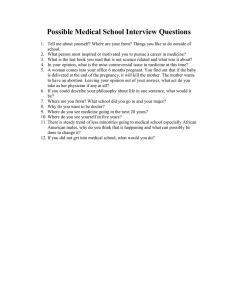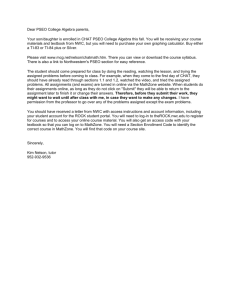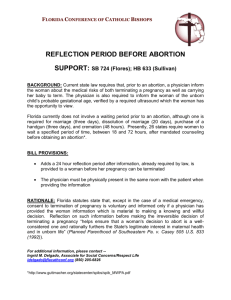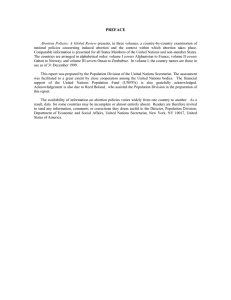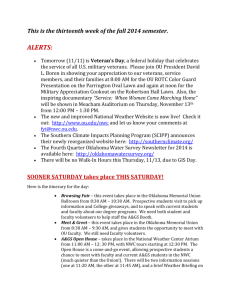Provide - Holy Trinity Catholic Church
advertisement
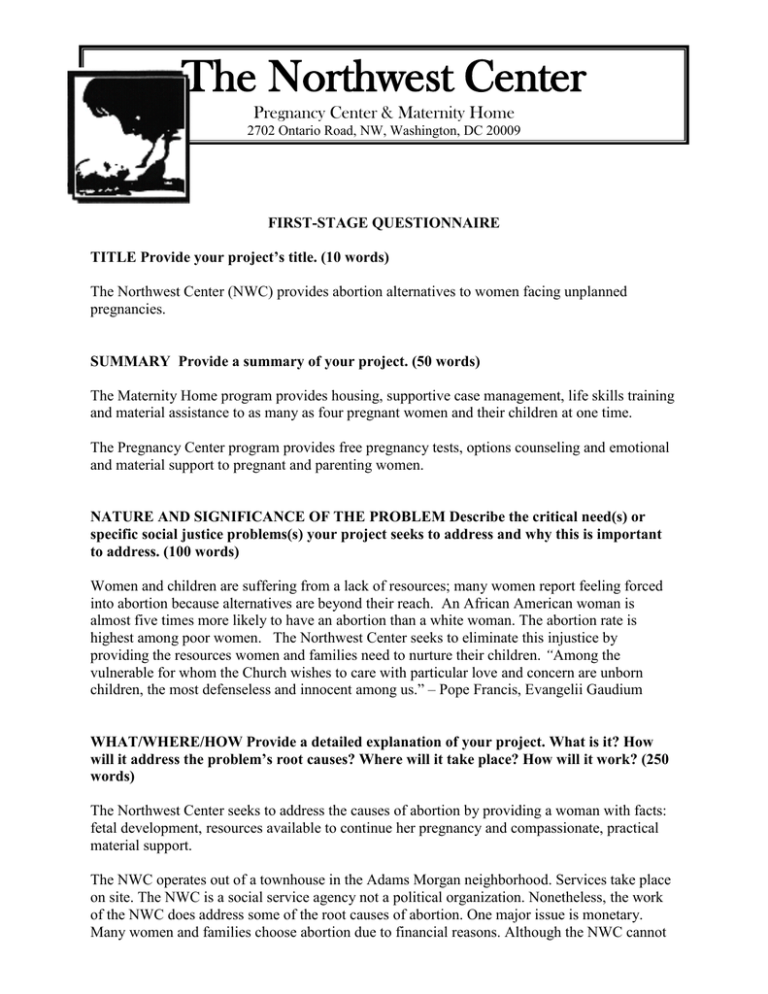
The Northwest Center Pregnancy Center & Maternity Home 2702 Ontario Road, NW, Washington, DC 20009 FIRST-STAGE QUESTIONNAIRE TITLE Provide your project’s title. (10 words) The Northwest Center (NWC) provides abortion alternatives to women facing unplanned pregnancies. SUMMARY Provide a summary of your project. (50 words) The Maternity Home program provides housing, supportive case management, life skills training and material assistance to as many as four pregnant women and their children at one time. The Pregnancy Center program provides free pregnancy tests, options counseling and emotional and material support to pregnant and parenting women. NATURE AND SIGNIFICANCE OF THE PROBLEM Describe the critical need(s) or specific social justice problems(s) your project seeks to address and why this is important to address. (100 words) Women and children are suffering from a lack of resources; many women report feeling forced into abortion because alternatives are beyond their reach. An African American woman is almost five times more likely to have an abortion than a white woman. The abortion rate is highest among poor women. The Northwest Center seeks to eliminate this injustice by providing the resources women and families need to nurture their children. “Among the vulnerable for whom the Church wishes to care with particular love and concern are unborn children, the most defenseless and innocent among us.” – Pope Francis, Evangelii Gaudium WHAT/WHERE/HOW Provide a detailed explanation of your project. What is it? How will it address the problem’s root causes? Where will it take place? How will it work? (250 words) The Northwest Center seeks to address the causes of abortion by providing a woman with facts: fetal development, resources available to continue her pregnancy and compassionate, practical material support. The NWC operates out of a townhouse in the Adams Morgan neighborhood. Services take place on site. The NWC is a social service agency not a political organization. Nonetheless, the work of the NWC does address some of the root causes of abortion. One major issue is monetary. Many women and families choose abortion due to financial reasons. Although the NWC cannot offset all of these costs, we do help with material resources (diapers, wipes, formula, baby furniture and clothing); we also collaborate with other agencies to help families pay rent, find affordable housing, supplement their income with food and clothing banks. The NWC frequently works with women who are forced to choose between continuing their pregnancy and losing their housing or having an abortion to maintain their housing. Families served by the Pregnancy Center participate in monthly meetings where they receive practical assistance, emotional support and resource referral. The Pregnancy Center receives numerous phone calls from women in crisis who are seeking an abortion. The nonjudgmental compassionate response of NWC staff let women know that there is hope, and they do have options. The more women we reach, the more women in the community will know that there is somewhere they can turn when facing an unplanned pregnancy. Additionally, women who find themselves homeless due to their pregnancy will know they can find housing. IMPACT Who will benefit directly and indirectly from your project? Explain in detail how you will measure impact. (200 words) Low income, minority women and children (in particular the unborn) will directly benefit from the project. Entire families benefit directly and indirectly. When a family participates in the program, it is not only the unborn child who is helped but also other siblings and family members. Because of their positive experiences with the NWC, families served refer others (49% of families who came to the NWC for the first time in 2014 heard about it through word of mouth). In 2014, the Northwest Center served more than 1,800 individuals. Of those, 42% were Hispanic and 48% were African American. Nearly 900 single mothers received help from NWC in 2014. The NWC uses a database to track the demographics of people served as well as the services they were given. We are continually working to improve our evaluation criteria. Currently, we track how many families we provide with SIDS prevention education and the follow up for these children. Washington, DC has one of the highest infant mortality rates in the US. We also track the number of women we serve who are considering abortion and how many continue their pregnancies and how many seek an abortion. Data collected for women who participate in the maternity home program includes the number who receive a GED or high school diploma, or enroll in a job training or higher education program and the number of women who transition into stable housing. SUSTAINABILITY What lasting benefits do you anticipate will result from your project? Specifically, how will benefits endure without additional funding from Holy Trinity? (100 words) Since its founding by Georgetown students and alumni in 1981, the Northwest Center has become the largest provider of pro-life services in Washington, DC. Despite working with a small budget, it has expanded to include the maternity home, and the same determined spirit of compassion, efficiency, and good stewardship that brought us this far will carry us forward. Our past success making big changes with small resources, has taught us how to endure. The benefits will include women who delivery full-term, healthy birth weight babies and women who can focus on becoming self-sufficient instead of using all their energy to focus on how she and her baby can survive financially. OPERATIONS AND TIMEFRAMES Outline your operational plan. What operational milestones do you intend to achieve in the next one to two years? (100 words) Our goal is to increase the number of women reached who are considering abortion to offer the message of hope for themselves and their unborn children. We expect to serve more than 2,400 people in 2016. We also seek to increase the number of abortion vulnerable women we seek and increase the number of women who choose to continue their pregnancies. RISK MANAGEMENT What are your project’s biggest risk factors or potential barriers? How do you plan to mitigate them? (150 words) The NWC is working with a foundation to provide funding for increased advertising via internet. This will increase the number of women calling for abortion alternatives. It will be challenging for the small staff to field this increase in calls (which will also occur outside of business hours). The NWC will recruit more volunteers to handle this increased call volume. Following up with families who often change their phone numbers and move around frequently is a challenge. With the women’s consent, we are increasingly using technology to help stay in contact with women via email and other social media. MANAGEMENT CAPABILITY AND STRUCTURE Explain why your organization is qualified to carry out your project. Describe your proposed management team, including key team members’ experience and 6 qualifications as they relate to implementing the project. If applicable, include information about additional resources you can bring. (250 words) The NWC’s staff is made up of three full-time paid staff, one Jesuit Volunteer and two part-time staff. The staff, though small, is highly qualified and professionally trained. The Programs and Maternity Director is a Licensed Clinical Social Worker. She holds a Masters in Social Work and has 15 years experience in the field, 9 of which have been with the NWC. The Pregnancy Center Director is a social worker holding a BA in Social Work; she has worked at the NWC for 3 years. The Jesuit Volunteer, Development Director, Resident Manager, and Bookkeeper all have Bachelor’s Degrees. Six qualifications include: 1. Expertise in the field of working with abortion vulnerable women. 2. Both program directors have redesigned existing services within each program as well as having created, executed and analyzed evaluation data. 3. Counseling skills 4. The NWC works with undergraduate and graduate students every semester. They help with evaluation of the program, the agency, as well as the practical volunteer work directly aiding the families. This helps us to continue to grow and oftentimes to access a skill set not possessed by the staff. 5. Working collaboratively with other agencies, individuals, churches and groups in the community to help the community work towards this social justice issue and also providing the best possible service by using all available resources. 6. Experience handling crisis, unforeseen circumstances whether they be staffing, programmatic or dealing with the physical plant. Ability to come up with creative solutions as well as addressing problems with insight, integrity and a sense of humor.
